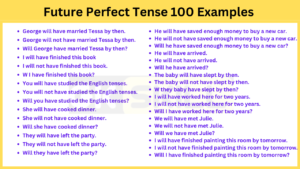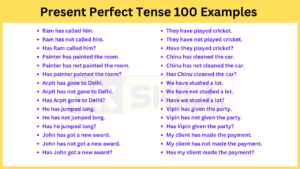Future Perfect Continues Tense: The Future Perfect Continues tense is formed by using the “ing” form of the verb, and by adding “will have been” helping verb. Here is the List of 50+ Examples of Future Perfect Continues tense. This List contains some simple sentences, interrogative and negative sentences:
Structure of Future Perfect Continues Tense
| Positive Sentences | Subject + will have been +Ving + Object + Other words |
| Negative Sentences | Subject + will + not + have been +Ving + Object + Other words |
| Interrogative Sentences | Will + Subject+ have been +Ving + Object + Other words |
Future Perfect Continues Tense 50 + Examples
- I will have been playing tennis for an hour by the time you arrive.
- I will not have been playing tennis for an hour by the time you arrive.
- Will I have been playing tennis for an hour by the time you arrive?
- They will have been waiting for us for an hour.
- They will not have been waiting for us for an hour.
- Will they have been waiting for us for an hour?
- We will have been traveling for a month by the time we return home.
- We will not have been traveling for a month by the time we return home.
- Will we have been traveling for a month by the time we return home?
- They will have been married for fifty years next year.
- They will not have been married for fifty years next year.
- Will they have been married for fifty years next year?
- They will have been swimming for three hours by the time the pool closes.
- They will not have been swimming for three hours by the time the pool closes.
- Will they have been swimming for three hours by the time the pool closes?
- We will have been driving for twelve hours straight by the end of the day.
- We will not have been driving for twelve hours straight by the end of the day.
- Will we have been driving for twelve hours straight by the end of the day?
- I will have been working at this job for a year by the end of the month.
- I will not have been working at this job for a year by the end of the month.
- Will I have been working at this job for a year by the end of the month?
- You will have been working when I arrive.
- You will not have been working when I arrive.
- Will you have been working when I arrive?
- He will have been studying long enough to qualify.
- He won’t have been studying long enough to qualify.
- Will he have been studying long enough to qualify?
- She will have been working at the company for ten years next year.
- She will not have been working at the company for ten years next year.
- Will she have been working at the company for ten years next year?
- We will have been traveling for a year by the time we return home.
- We will not have been traveling for a year by the time we return home.
- Will we have been traveling for a year by the time we return home?
- I will have been living in this city for three years by next summer.
- I will not have been living in this city for three years by next summer.
- Will I have been living in this city for three years by next summer?
- By this time next week, I will have been working at this job for three months.
- By this time next week, I will not have been working at this job for three months.
- Will I have been working at this job for three months by this time next week?
- He will have been playing the piano for ten years next month.
- He will not have been playing the piano for ten years next month.
- Will he have been playing the piano for ten years next month?
- They will have been waiting in line for two hours by the time the store opens.
- They will not have been waiting in line for two hours by the time the store opens.
- Will they have been waiting in line for two hours by the time the store opens?
- By the end of the day, she will have been studying for her exam for twelve hours.
- By the end of the day, she will not have been studying for her exam for twelve hours.
- Will she have been studying for her exam for twelve hours by the end of the day?
- I will have been running for a marathon for six months by the time of the race.
- I will not have been running for a marathon for six months by the time of the race.
- Will I have been running for a marathon for six months by the time of the race?
- I will have been studying English for five years by next year.
- I will not have been studying English for five years by next year.
- Will I have been studying English for five years by next year?
- She will have been working for ten hours by the time she finishes her shift.
- She will not have been working for ten hours by the time she finishes her shift.
- Will she have been working for ten hours by the time she finishes her shift?
- They will have been living in their new house for a year in May.
- They will not have been living in their new house for a year in May.
- Will they have been living in their new house for a year in May?
- By the end of the week, he will have been running for seven days straight.
- By the end of the week, he will not have been running for seven days straight.
- Will he have been running for seven days straight by the end of the week?
Read Also: –
- 100 Examples of Present Indefinite
- 100 Examples of Present Continues
- 100 Examples of Present Perfect Tense
- Examples of Present Perfect Continues Tense
- Examples of Past Indefinite
- 100 Examples of Past Continues
- 100 Examples of Past Perfect Tense
- 100 Examples of Past Perfect continues tense
- Examples of Future Indefinite Tense
- 100 Examples of Future continues Tense
- 100 Examples of Future Perfect Tense
- Examples of Future Perfect continues tense
- English Grammar full pdf Download
- One word substitution List
- List of Idioms and phrases
- What is Noun?
- What is Pronoun?
- What is adjective?
- What is adverb?
- Daily use English Sentences
- List of 1000 verb
- Opposite word list
- All Tenses list with example
- How to introduce yourself?
- Preposition English Grammar List
- Informal and Formal verb List
- List of important full form
- A, An, The articles
- What is conjunction? With example
- Parts of speech English Grammar
- Active and passive voice English grammar




